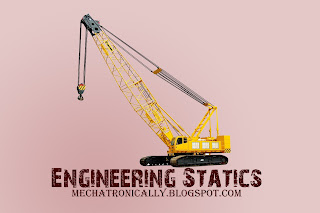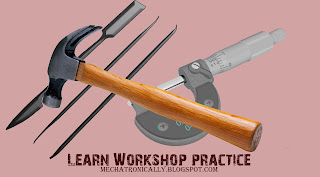Starting with the definition of Mechanics, it is a branch of physics that deals with the state of rest or motion of the bodies which are subjected to the external forces. Mechanics is further divided into three categories namely, rigid body mechanics, deformable body mechanics, and fluid mechanics. In this course we will stick to the rigid body mechanics as it provides the base for deformable body mechanics and fluid mechanics. Moreover, rigid body mechanics is an important tool to design and analyse the mechanical structures, components and electrical devices that we encounter in engineering.
Rigid body mechanics is further divided into two main areas namely, statics and dynamics.
Statics is concerned with the equilibrium of bodies, i.e. those that are at rest or moving with constant velocity. On the other hand, Dynamics is concerned with accelerated bodies. Statics is an important course of study for many engineering courses because it provides the basic knowledge to treat with those objects that are designed with an objective to remain in equilibrium through out it's life.
If we search for the origin of statics and dynamics, we find that, knowledge of statics evolved earlier than dynamics. We find the principles of statics in the work of Archimedes (287-212 B.C.). While on the other hand, we all know principles of dynamics are dependent on accurate and precise measurement of time. Galileo Galilei (1564-1642) is one of a major and earlier contributors to this category of mechanics.
Mechatronics engineering syllabus offer this course, because this is one of basic course of mechanical engineering. So mechatronics engineers must master this course to call themselves real mechatronics engineers.
 |
| Introduction to Engineering Statics |
Rigid body mechanics is further divided into two main areas namely, statics and dynamics.
Statics is concerned with the equilibrium of bodies, i.e. those that are at rest or moving with constant velocity. On the other hand, Dynamics is concerned with accelerated bodies. Statics is an important course of study for many engineering courses because it provides the basic knowledge to treat with those objects that are designed with an objective to remain in equilibrium through out it's life.
If we search for the origin of statics and dynamics, we find that, knowledge of statics evolved earlier than dynamics. We find the principles of statics in the work of Archimedes (287-212 B.C.). While on the other hand, we all know principles of dynamics are dependent on accurate and precise measurement of time. Galileo Galilei (1564-1642) is one of a major and earlier contributors to this category of mechanics.
Mechatronics engineering syllabus offer this course, because this is one of basic course of mechanical engineering. So mechatronics engineers must master this course to call themselves real mechatronics engineers.





















